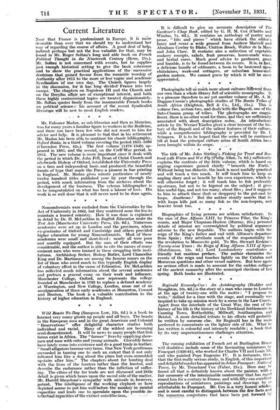Nonconformists were excluded from the Universities by the Act of
Uniformity in 1662, but they contrived none the less to maintain a learned ministry. How it was done is explained in detail by Dr. H. McLachlan in English Education ander the Test Acts (Manchester University Press, IN.' 6d.). Ninlierous academies were set up in London ,and the ;provinces, -where ex-graduates of Oxford and Cambridge and .otheis provided higher education for young Nonconformisti. Most of-these academies were small and short-lived ; nearly all were poor and scantily equipped. But the sum of their efforts was considerable, and the author is able to-cite the names of many eminent men who were trained in these struggling little insti- tutions. Archbishop Seeker, Bishop Butler, Lord- Chancellor King and Dr. Martineau are among the famous names on the list of those who owed much to this typically English display of voluntary effort in the cause of Education. Dr. McLachlan has collected much information about the several academies and prefixes a general essay on their work and influence. Manchester College, Oxford, now represents the college founded at Manchester in 1786 to replace a defunct academy at Warrington, and New College, London, arose out of an amalgamation of three early academies at Homerton, Coward and Hoxton. The book is a valuable contribution to the history of higher education in England.
































































 Previous page
Previous page